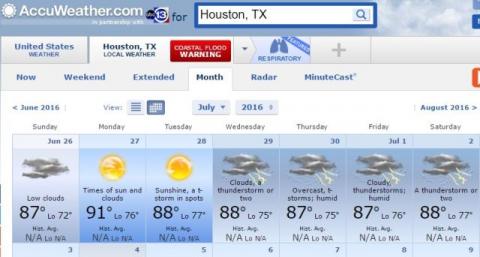The ability to throw more computer processing power at forecast models has substantially improved the ability of meteorologists to predict the weather. A recent analysis found that a modern five-day forecast is as accurate as three-day forecast was in 1995. In the last three decades, thanks largely to numerical weather prediction, the useful window of forecasting has moved out from about 7 days to 10 days.
Yet beyond 10 days, most meteorologists will say, there is little predictive skill. This is largely due to the "butterfly effect," in which only a very small change in initial conditions will have huge changes after about 10 days. However, in August of 2013, this basic mathematical principle didn't prevent AccuWeather from beginning to issue 45-day weather forecasts.
According to an analysis by the Capital Weather Gang, a widely respected site that forecasts conditions for around Washington DC, these 45-day forecasts showed no "skill" after about 10 days. "AccuWeather is a for-profit company and they have every right to pass off less-than-accurate forecasts as they wish, but the public deserves to know that these 45-day forecasts are not rooted in any science currently available to meteorologists and have not demonstrated value," the site concluded. "Caveat emptor."
AccuWeather is one of the largest private forecasting companies in the world, and in many ways has pushed the boundaries of private weather forecasting. In 2005 the Pennsylvania-based company, with the support of its home-state senator Rick Santorum, backed legislation that would have precluded the National Weather Service from sharing its data and forecasts with the general public. This legislation was resoundingly defeated because, well, if taxpayers are paying for the National Weather Service to make forecasts, they ought to have access to them.
Criticism of that legislation or the 45-day forecast hasn't stopped AccuWeather, either. It has now embarked upon its latest innovation—90-day weather forecasts. In a recent interview with NPR, AccuWeather Founder and President Joel Myers defended the practice, saying: "If we didn't have the statistics to show that the forecast—and here's the measure of what the value is—it's got to be more accurate statistically than you can come up with by using past normals and whatever climatology that you have, and it does."
This has not mollified forecasters, who realize that their credibility is at risk when people are checking for a weather forecast 90 days from now. Meteorologist Dan Satterfield, who writes about atmospheric science for the American Geophysical Union, summed up how most forecasters feel about this latest innovation. "These forecasts are actually even worse than the Farmer’s Almanac, since they give rain chances and temperatures for exact points months into the future!" he wrote. "This kind of thing should be condemned and if you have an AccuWeather app on your smart phone, my advice is to stand up for science and replace it."


Spread the word